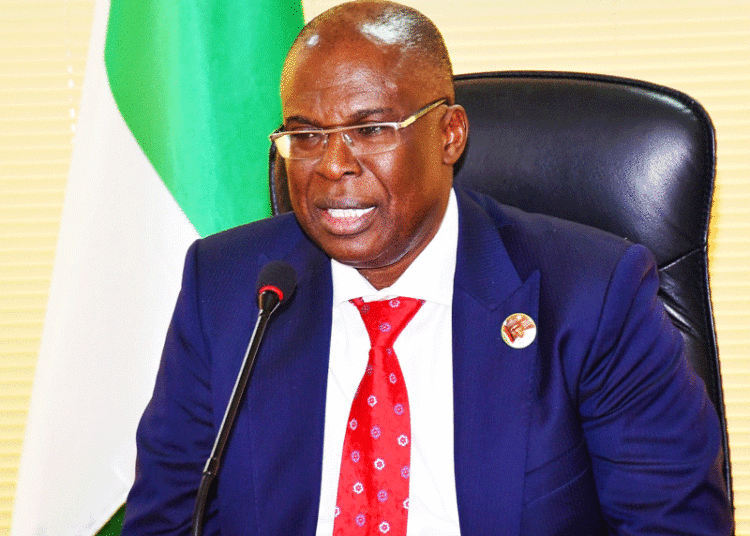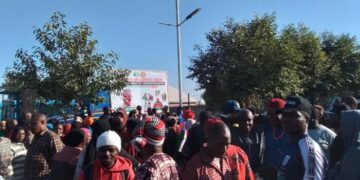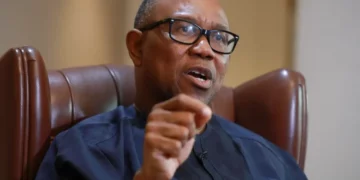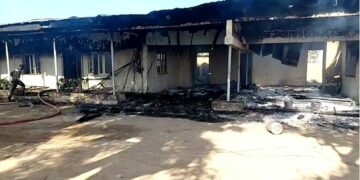The federal government has said the ongoing fuel scarcity will persist in Abuja and some major cities because marketers prefer to sell above the official pump price of N165 per litre.
The minister of state for petroleum resources, Tmipreye Silva, who disclosed this to State House correspondents after the Federal Executive Council (FEC) meeting presided over by President Muhammadu Buhari at the presidential villa, noted that selling above the official pump price obtains in the hard-hit towns.
FEC also approved a total sum of N2.449 billion for projects in the Ministries of Petroleum Resources and Environment.
The minister of environment, Muhammed Abdullahi, who also briefed journalists after the meeting, said the Council awarded the contract for consultancy services and design of the Centre of Excellence for Environmental Restoration with an Integrated Contaminated Soil Management Centre at the sum of N449,250,040.50 (VAT inclusive).
He said the establishment of the centre which is in fulfillment of the president’s promise to the Ogoni people is meant to impact them in terms of employment generation and laboratory tests for land remediation efforts on the site contaminated so that it could be made easily cultivatable by the people for their fisheries, farming activities and access to water.
On his part, Sylva also said the council approved the award and procurement for the provision of a Conference Hostel Facility in Yenagoa, adjacent to the Nigerian Content Towers, at the sum of N22 billion to Megastar Technical Construction Company, with a completion period of 24 months.
Explaining why fuel queues will continue to persist in Abuja and other parts of the country, the minister said it would persist for a while until the fuel is finally deregulated.
He noted that the fuel queues were not caused by shortages in the supply of fuel but by the reluctance of petroleum marketers to sell at the recommended retail price.
He said there were queues in Abuja because selling at the recommended N165/liter of fuel was unprofitable to the marketers who resolved to take advantage by diverting products from the city centre to where they could sell above the recommended retail price.
“If you look at it, there are no queues when you leave Abuja. In most places, only in the Abuja metropolis do you continue to have these queues. So, is it that there is less supply to Abuja than to the rest of the country? It is not so. It is because if you go out of Abuja, they can afford to probably sell at higher prices.
“And I’m sure a lot of you must be buying at higher prices. But within Abuja, because of the watchful eye of the federal government, they cannot sell at those prices. So it’s not a very attractive market for them. I think these are all things that we might have to be dealing with for a while until we’re able to fully deregulate,” the minister stated.
Giving update on the rehabilitation of the nation’s refineries, Sylva said the Port-Harcourt refinery would soon become operational, adding that the Dangote Refinery would commence operation by January next year.
“So, these issues will gradually be resolved and we will get to the point where Nigeria will be fully supplied from in-country refined products,” he assured.
On why Kaduna and Warri Refineries’ workers were still drawing salaries even when they were not producing anything, the minister explained that most of the workers have been redeployed, with few others doing skeletal services to prevent pilfering at the facilities.
“But I can assure you that most of the workers in the refineries have been redeployed to other parts of NNPC,” he said.
On the high cost of gas (diesel), the minister said it was so first because the product had been deregulated.
“But of course, you know the geopolitical tensions in Ukraine and Russia are still on and it’s affecting the global prices of this commodity.
“So, it is not something from Nigeria. It is something that is affecting the global community; everywhere in the world is having the same problem. If you go to the UK, they are still talking about inflation; if you go to America, they’re talking about inflation, because there are issues and it’s all coming from the geopolitical tensions in Ukraine and Russia.
“So, I believe that we will also have our fair share of some of these problems. While we try to see how we can ease the problem here, we’re also looking at how we can bring in additional supply from some stranded volumes that we have.
“We probably might be able to do something about the gas prices, maybe in the short term, but it is not a subsidized commodity. And that’s why the government cannot really do too much about the price of gas,” he said.
Fuel Scarcity: IPMAN Decries Profiteering At Private Depots
Meanwhile, general secretary of PENGASAAN, Comrade Lumumba Okugbawa, has expressed shock over the ongoing fuel scarcity in spite of payment of subsidy.
Speaking with LEADERSHIP yesterday, he said, “We in PENGASSAN are equalling disappointed just as other Nigerians are in the face of fuel scarcity because NNPC is telling the nation that there is enough fuel, yet Nigerians are suffering in midst of plenty.”
Lumumba however said there is no short cut solution than to keep refineries in working condition.
In his reaction, the president of Union of Chemical, Footwear, Rubber, Leather and Non-Metallic Products Employees (NUCFRLANMPE), Comrade Goke Olatunji, described the scarcity as artificial created by some people for reasons best known to them.
Olatunji said, “Tanker drivers are pointing accusing fingers on the Russian and Ukraine war for diesel, while we all know that failure to repair the national refineries is the cause. Government and most people are waiting for Dangote to start production next. But how are we sure that too will not be monopolised at the detriment of Nigerians?”
In his reaction, the general secretary of the Iron and Steel Senior Staff Association of Nigeria (ISSSAN), Comrade Lucky Odigie, described the scarcity as act of insincerity on the part of federal government.
“Federal government’s promise to repair the national refineries is still being waited for by Nigerians. Insincerity by government is what is causing confusion today. Government is creating confusion and Nigerians are also confused by the way and manner government is misleading the people with either subsidy or not. It is a pity we have entered one chance by voting for APC,” Odigie lamented.
Similarly, Lanre Arogundade, director of the International Press Centre (IPC), said this is a sign that the country is in serious crisis.
“Nigerians are going through hardship and pains because things are not working as they ought to be,” he pointed out.
Speaking further, Arogundade said Nigerians are being subjected to unwarranted pains and suffering.
“Unless there are functional refineries issue of subsidy being paid or not will continue. Nigerians are suffering, while the country export crude oil and buy back refined products, thereby creating jobs and wealth for other nations,” he said.




